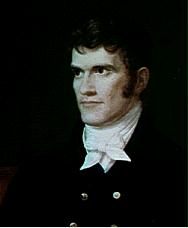The Shakeup
The subsequent ruling by Congress declared that the Bank was a constitutional institution. Jackson continued to lobby support for his efforts despite this. Biddle saw an opportunity with the ruling and had copies of the congressional reports printed and distributed throughout the country[39]. This shifted some weight back towards Biddle's side. At this point he possessed the means with which he could apply for the Bank's recharter. Jackson seemed to be falling behind in the war and a disruption was occurring in his Cabinet. The scandal over Peggy Eaton, the wife of Secretary of War, John Eaton, had divided the Cabinet members and their spouses. Jackson's own Vice President,

|
It was becoming clear that changes needed to be made within. Martin Van Buren resigned as Secretary of State and became Minister to Great Britain. He, along with Eaton resigned purposely, however, in order to make it easier to remove the Calhoun supporters from the Cabinet. The idea was that, by asking two of Jackson's supporters to step down in the interests of reorganization, it would be easier to ask Calhoun supporters to do the same. New Cabinet members were appointed such as Edward Livingston as Secretary of State, Lewis Cass as Secretary of War, Louis McLane as Secretary of the Treasury and Levi Woodbury as Secretary of the Navy[42]. What was surprising about the new appointees to the cabinet was that they all tended to support the Bank, especially Livingston[43]. This, however, was not all good news to Biddle as one of the new members would turn out to be one of his most determined opponents, Roger B. Taney who became Jackson's Attorney General[44].
